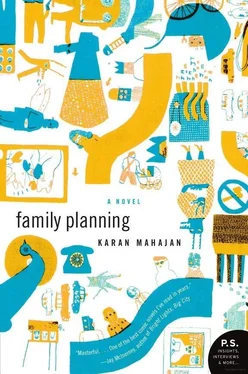“Why are you watching MTV?” he asked. “Don’t you know your age?”
“I have declared ban on StarPlus,” she explained. “Because of—”
“Mohan Bedi?”
“Mohan Bedi.”
“Well, stop worrying — your Mohan Bedi is going to live,” he said to Sangita.
Sangita had now put the baby down and was sitting on a stool with a hot-water bottle flopped across her lap, one hand pressed on the side table for support, so that even the act of relaxation looked grueling.
“But he is dead,” she said.
“Yes, yes, but he will be alive tomorrow.”
“How will he be alive? He died in tub. Body was shown. Cell-o-phone was shown.”
“Tcch. What is the problem? His twin died. The twin was in the tub,” he bullshitted, “instead of Mohan. Twist of fate.”
“He had no twin, ji.”
“What do you mean— how did he get in ? You have not seen two people in a tub? Brothers were bathing together, Mohan went outside to get soap, left the phone in the tub.”
“But, ji—”
“Sangita,” he said, suddenly, “I’ve told him.”
Sangita tried not to blink. When Arjun had asked last night if she had “tricked” Mr. Ahuja, she’d consoled herself by thinking: At least he still thinks I am his real mother. Now that consolation was lost. She was confident that Arjun hated her.
Normally she’d have cried, but she felt she owed Mr. Ahuja nothing. She stalled. “Ji, told who? Told Shankar to make tea? Told postman to send post?”
“Sangita! I’ve told Arjun. About his mother,” Mr. Ahuya said. Then, stroking her hair, “Sorry.”
“Thank you,” she said. Then she began knitting again.
Mr. Ahuja sputtered, “I did it for you. I told him you had been a very good mother. I told him nothing will be different. I told him he had to know, but the past is the past. I hope that is okay. I am sorry. But you only wanted me to tell him—”
Sangita nodded. “Yes, ji. Thank you.” She smiled. That was the end.
“Has he told you anything?”
She shook her head.
Mr. Ahuja was understandably abashed as he made for the door. Sangita had taken the news so well that he felt even more guilty about having concealed from her the fact that he’d told Arjun about the “switch.” He’d acted as if he’d done her a favor when, in fact, he’d cheated her. He ought to have sunk to his knees and apologized. He ought to make it up to her — but how? He knew nothing about this woman, this wife of fifteen-odd years. Vague details, yes — the tough jackfruits of her elbows, the sullen hump of her jaw, the bulbous nose she had proudly passed on to each child except for Arjun, TV, clean clothes, T-series cassettes, a fierce protection of her Right to Eat at the table — but nothing more. He twisted and turned in his head the Rubik’s cube of domestic details and arrived at no sustainable patterns. His mind was a drawer rummaged of all its contents. He remembered what Rashmi always told him, I used to be really afraid of dying until I was in love, I thought who will have known me if die, those oddly prescient words, though of course a person’s entire life became an arrow of prophecies once they passed, he knew that, and Sangita had probably never loved anyone in her life and she would die as vaguely as she had lived. Sangita was a symbol, a darkness. When she died, she would be dead, completely gone. As Rashmi tended to zero in his mind, so did Sangita. One day they would both explode into nothingness, and Mr. Ahuja pictured himself an old man bathed in fog, surrounded only by his children. But no, here he was — at the threshold of the nursery — years before the event.
Like a true slave of marriage, he would have to go down on his knees and ask his children what his wife truly loved.
Mr. Ahuja shuddered as he heard Sangita transmitting thicker and thicker strands of dissatisfaction between the twin antennae of her needles. He was back in the hotel room the morning after his wedding, waking to an empty bed, the bride gone, his illusion of complete control utterly zapped, his misogynies exploded, the sheets on the bed crinkled with newborn peaks and valleys: He was deeply despicable, awful, self-centered. He was thinking : I deserve no better than this woman. If I find her outside, I will marry her. I will marry her and treat her kindly.
But still he was thinking only of himself.
“I love you,” Mr. Ahuja said, ludicrously, turning around. He walked confidently toward Sangita, arms swinging.
Sangita now was truly shocked. She bent down from the stool and picked up a ball of yarn and stuck a needle through it. She blew her nose loudly on a napkin.
Mr. Ahuja got down on his knees before her stool and said it again, “I love you.”
She brought a fold of her nighty up to her face and soaked it in tears.
Mr. Ahuja loomed over her with his nostrils quivering. “I love you darling. We have been through very difficult times together. You have been a good wife. Come. Let me take you to a film today. We’ll go to the movies. Anything you want.”
Mr. Ahuja made at least ten more promises he wouldn’t keep, but it worked: she got up and stood in his arms. She let Mr. Ahuja do what he wanted. She limply put her head on his shoulder. She let him grope her fetching protuberance. She let him go erect against the overhang of her stomach. She knew he was lying and that she’d be disappointed — these were tears of loss, not joy — but she had waited so many years to hear these words that she didn’t care. She let him stand there and be a man. Mr. Ahuja was grateful for her cooperation, for her warmth; he held her tighter and tighter. Soon the gratefulness became pride. He felt proud that he’d stood his ground, that he hadn’t stormed off, that he’d told Arjun the secret, that he was holding his wife amidst the mewls of his offspring, lying to her for her sake. Let Arjun walk in on him now, he thought. Let Arjun gawk at him now. He was in a compromising position, but at least it resembled affection.
CHAPTER 23. THE WRONG BUS STOP
THE AHUJA EARLY MORNING Waking Undertaking was a fragile hierarchy. This is how it worked: Rakesh woke the oldest child; and then the oldest child woke the next; and so on until there was a huge queue forming outside the two bathrooms for a speedy brush-bath-shit-and-breakfast, a rowdy routine marred by toothbrush duels and the sound of slippers thwacking angrily against doors that were locked too long. Everyone got five minutes; and you bathed on alternate days, substituting the snow of talcum powder for soap, and heaven forbid if you tried to break the rules, there’d be shouting and the rehearsed revenge of your siblings to pay, they’d radar your movements through the day and prevent you from using the bathroom even if you were caught in the dire throes of shit, and then what? You’d have to run out into the street and make a beeline for the bushes.
Sangita’s role in the organization was that of first pisser (special quota for pregnant ladies!) and final checker (once a week). She’d stand at the door, examine each sleepy tie, brush the lint off the children’s shoulders (even if it meant standing on her toes for the boys), hand them their hotfoiled-parathas, and finally put her chubby hand to the small of their backs and shove them out of the house one by one, Rakesh included. So, Sangita might have been at the bottom of the chain, but she was the one who gave the go-ahead, the all-clear, the Sayonara baby , and if she noticed that anything was amiss or that one of the kids was dripping snot onto his or her white uniform she could choke the entire convoy, bring all progress to a halt, and mop the nosey crowd with a giant hanky.
Читать дальше












